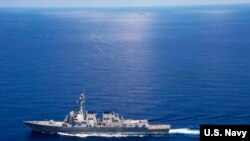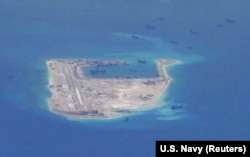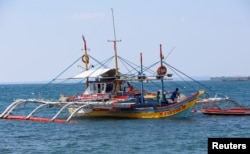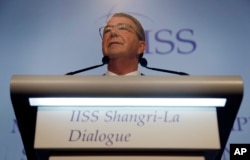A debate is raging about which side has an edge in the South China Sea dispute, as senior Chinese and U.S. officials meet in Beijing this week to try to resolve sources of tension between them.
China occupies many of the islets and reefs of the South China Sea, a key transit route for international trade. It claims sovereignty over almost all of the sea, despite competing claims and occupations of islets by five other regional governments: Brunei, Malaysia, the Philippines, Taiwan and Vietnam.
The United States expresses neutrality on the territorial disputes. But, it occasionally sends U.S. aircraft and vessels near the Chinese-controlled islets, saying it wants to ensure freedom of navigation in international waters.
China has criticized those U.S. military maneuvers as provocative and supportive of the territorial claims of U.S. allies such as the Philippines. Beijing also has built artificial islands on seven of the reefs it controls and in recent years has deployed military hardware on some of them.
“China is saying, 'We’re here, you can’t do anything about it,'” said Philip Reynolds, a researcher on global conflicts and a PhD candidate at the University of Hawaii. “That’s really the basis of my argument that China is winning, or really, it has won.”
Advantage: China
In an interview for VOA’s China 360 podcast, Reynolds said the only way for the United States to reverse China’s reclamations in the Spratly Islands would be to initiate a costly war for which Americans have no appetite. He said Beijing knows this, which is why U.S. freedom of navigation exercises don’t cause the Chinese government to do much more than protest loudly.
“I don’t think China is necessarily trying to stop the United States from being in the area. The goal is, China showing that the United States can’t stop it from being in the area,” Reynolds said.
Both Washington and Beijing say they want the maritime disputes to be resolved diplomatically.
British journalist Bill Hayton, who researches Asian affairs at London’s Chatham House institute, has a different view of the U.S. and Chinese maneuvering in the South China Sea.
Deterrence impact
Hayton, author of South China Sea: The Struggle for Power in Asia, believes Beijing has not “won” the battle with Washington, especially in light of the situation at Scarborough Shoal. That unoccupied reef is claimed not just by China, but also the Philippines – a U.S. ally which hosts American warplanes that flew near the reef in April.
“In the weeks running up to that, there was a lot of discussion about whether China was marshaling ships there, whether it was prepared to start dredging and building land and this kind of thing, and it didn’t happen,” Hayton told VOA. “And it looks as if the U.S. was able to deter a Chinese attempt to build on Scarborough Shoal, but we can’t be sure.”
Hayton also said Beijing has not occupied and developed any new islets in the South China Sea in more than 20 years because Chinese leaders fear the consequences.
“They know that there would be a major diplomatic fallout that would destroy any sense of them being an honest player in the region, and that (such a move) would be so against the 2002 Declaration on the Conduct of Parties in the South China Sea that it would destroy China's credibility and upset the whole of Southeast Asia,” Hayton said.
China’s credibility faces another threat in the coming months.
Impending setback for Beijing?
A U.N. arbitration panel in The Hague is due to rule on a Philippine complaint against China’s claim to a "nine-dashed line" boundary around the South China Sea, a claim that Manila says undermines the United Nations Convention on the Law of the Sea.
Beijing has rejected the tribunal’s involvement in the matter, saying it should be resolved only through direct negotiations with Manila.
Hayton said he expects the U.N. panel to rule at least partly in favor of the Philippines by clarifying that China does not have exclusive economic rights to certain waters. But he said the impact of such a ruling on Beijing’s position in the South China Sea would depend on how it responds.
“We have to see whether China actually encourages or discourages its fishing boats from going to fish in those areas, if the court rules that the Philippines in effect has jurisdiction over them,” he said.
A loss at the tribunal also could bolster perceptions that China is being isolated diplomatically.
Speaking last Friday in Singapore, U.S. Defense Secretary Ash Carter said Beijing’s actions in the South China Sea risk creating a ‘Great Wall of self-isolation.’ Carter also said U.S. allies in the region and other Asia-Pacific states share Washington’s concerns about Chinese intentions.
China’s diplomatic campaign
China has downplayed those concerns, saying it is a force for peace and stability because it is willing to resolve the maritime disputes through one-on-one negotiations with its smaller neighbors.
University of Hawaii researcher Reynolds said Beijing also is counting on support from its allies. “China is heavily wooing Cambodia, which gives it a flank around the Vietnamese-U.S. relationship,” he said.
Chinese state-run news agency Xinhua quoted Cambodian Deputy Prime Minister Hor Namhong on Monday as telling a visiting Chinese official that he backs China’s position. Xinhua also said Beijing has secured further support from African nations such as Tanzania, Uganda, Eritrea and Comoros.
Reynolds said China is seeking an even bigger diplomatic prize. “I think it's important to watch what Russia does,” he said. “Russia and China have conducted naval maneuvers together. And I think that's the power block to watch.”



